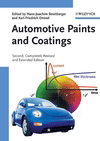BCF Survey Reveals Barriers to Recycling Leftover Paint

LONDON - The British Coatings Federation (BCF) has unveiled the results of its 2016 PaintCare local authorities survey, which reveal the barriers to recycling leftover paint as faced by Household Waste Recycling Centres (HWRCs) across the UK. The BCF’s PaintCare program aims to create a national paint recycling and remanufacturing scheme to make better use of the estimated 55 million liters of leftover paint generated each year in the UK, most of which is currently landfilled and incinerated. A national scheme for leftover paint would depend upon the creation of a national collection network, but currently only one in three HWRCs accept paint in the UK. The survey aimed to understand why the majority of HWRCs are not accepting paint and the challenges faced by those HWRCs that do accept paint.
Among the findings from the HWRC sites that do accept paint, the survey revealed that the majority of paint collected ends up in landfills or is incinerated. The survey found that the other half of collected paint is sent to a paint recycler or remanufacturer, highlighting that such a solution can work for HWRCs. The survey reaffirmed previous research commissioned by the BCF that reports sending paint to a paint recycler or remanufacturer presents a 40% cost saving to local authorities. The cost saving is largely due to the high cost to incinerate paint as hazardous waste, which is the current practice at many HWRCs.
The survey findings from the sites that do not collect leftover paint reveal the main barriers preventing local authorities from taking on a paint recycling service. Nearly 30% of those surveyed stated their reluctance to take on a paint recycling service was due to cost, while 25% said they do not have enough space on site. These findings indicate that in order to make a national solution possible, financial support and an increase in on-site storage are essential.
To read the full report, visit www.paintcare.org.uk/resources.
Looking for a reprint of this article?
From high-res PDFs to custom plaques, order your copy today!







